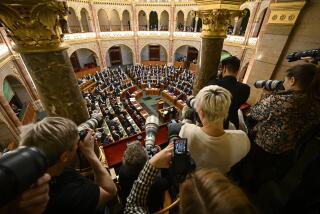German Legislature OKs Troop Role : Military: Parliament backs high court ruling on peacekeeping missions and Balkan patrols from the skittish nation.
- Share via
BONN — In a specially convened summer session, Parliament on Friday endorsed a supreme court decision allowing the German military to take part in international peace missions and approved the deployment of troops on NATO air and sea patrols in the Balkans.
The nationally televised vote marked the first time since World War II that Parliament has approved use of German troops in combat abroad, although it was largely symbolic because Germany joined the missions two years ago.
Foreign Minister Klaus Kinkel cautioned that the government does not intend to militarize its foreign policy.
“Even after the ruling, we will stick with our established culture of restraint,” he told legislators. “Normality in foreign and security policy does not mean playing world policeman.”
Defense Minister Volker Ruehe added on television that the high court decision “is not a marching order for worldwide deployments.”
Two weeks ago, Germany’s highest court ruled that the constitution allowed federal troops to participate in international military missions with the consent of Parliament.
The ruling was in response to actions brought by the opposition Social Democratic Party over Chancellor Helmut Kohl’s decisions to deploy German ships in the Adriatic Sea to help enforce an embargo against the rump Yugoslavia, send soldiers on radar surveillance flights over Bosnia-Herzegovina and order peacekeepers on the ground in Somalia.
The United States, United Nations and North Atlantic Treaty Organization have been urging Germany to play a greater role in international peacekeeping.
Kohl, who is seeking a seat for Germany on the U.N. Security Council, has agreed that the reunified country must take on more responsibilities in keeping with its size and economy.
Germans, recalling the country’s Nazi history, are nervous about giving a higher profile and more power to the military. But Kinkel argued that Germany is morally and ethically obligated to participate in peace missions “precisely because Germany has broken the peace in the past.”
Parliament agreed to the government’s request to lift restraints it put on the troops monitoring the former Yugoslav federation, giving them the same power as their allies to fire on ships in the Adriatic Sea that are suspected of breaking the embargo against Serbia and Montenegro.
German troops on NATO’s AWACS aircraft will also be allowed to fly over non-NATO member countries such as Austria and Hungary.
Kinkel said that for Germany to participate in future military missions, the operations must comply with international law and have a clear mandate.
“The military mission must be fulfillable, and the military components must be part of a convincing concept for a political solution,” Kinkel said.
Despite their court challenge, the Social Democrats voted for approval of the troop deployment. They said they only opposed the government’s unilateral decision to deploy troops and wanted a consultation with the legislature from the beginning.
“My party takes the view that . . . aggressive states are blocked economically and that this blockade should not rest only on resolutions but should be supervised and, if necessary, enforced militarily,” said Social Democratic leader Rudolf Scharping.
“Therefore, we vote for the deployment of troops in the Adriatic Sea,” he said. “The same is true for the supervision of the protective zones and for the enforcement of the ‘no-fly’ zone in Bosnia-Herzegovina.”
Scharping is challenging Kohl in the Oct. 16 federal election, and the daylong discussion of foreign policy often seemed like a campaign debate.
More to Read
Sign up for Essential California
The most important California stories and recommendations in your inbox every morning.
You may occasionally receive promotional content from the Los Angeles Times.










